#lately ive been reading the manga and its so epic
Text
OPM s2e3 Live Blog
“The Hunt Begins”
Ok I had 3 screenshots leaked to me before seeing the episode, but only one of them was spoiler-y in that I wasn’t sure if we’d get that far in the episode. And of course not only did I not leave work early, but had to stay an hour late. So without further delay, I’m hoppin to it. Reminder, I’m watching each episode as someone who is caught up with both the manga and web comic.
Alright, off the bat we’re getting the Charanko expulsion over with. I wasn’t expecting that, but it makes sense- it’s a good hook to lead with and set up the Garou issue before actually getting into Garou destroying everyone.
BTW I am Still not over the opening theme- nope it still gets me both visually and musically. (I definitely was not listening to the song on repeat at work all day. nope. what kind of nerd would do that definitely not me hahaaaaaa)
I like that Charanko doesn’t bat an eye that The Worlds Strongest Man King is there, or Blizzard of Hell, he’s just like ‘ah they’re multiplying.’ Fuckin kek. Saitama oh sweetheart, “Silver Fang” may be cool but to us you’ll always be the One Punch Man oh dear my heart
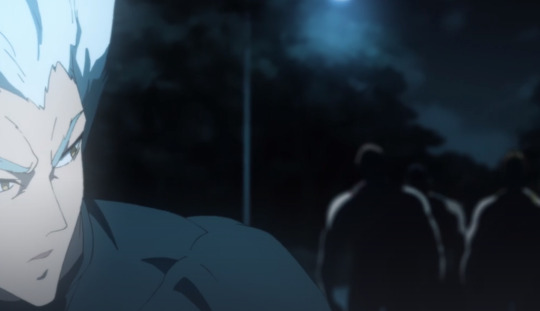
oh OH YES Guys you have no idea how excited I am for this fight?? I know Tank Top Master isn’t really popular but like I’m a gym rat so I’ve got a soft spot for him and Superalloy. Guys, in the databook his favorite things are chicken breasts and protein. Also I mean hes actually a decent guy too, but----- Anyway, wasn’t too hard finding Garou, was it Charanko?
Oh, oh right. Let me clarify I’m excited to see TTM get some screen time. Also to watch trash son (aka Garou) kick some ass. I’m, I’m not excited about him kicking Mumen’s ass specifically. This is gonna hurt.
(garou scary face)
His faces literally make me shout WOAH at my screen ok thanks scary trash son. Ah, lookit the tanktopper army!! Fukkin Tank Top Mask is there to I’m- yes, just yes.
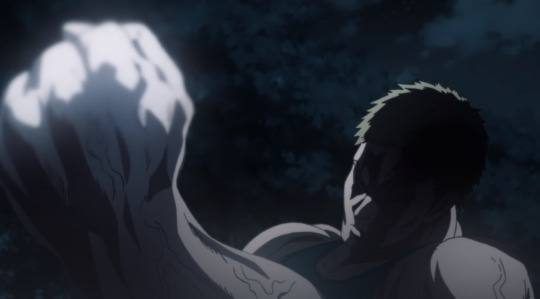
YES. MY BRO MY MAN KICK SOME ASS. Garou’s little ‘nani??’ omfg perfect.WAIT the little ‘haha~~’ THAT was perfect. I also need to point out here that in the manga Garou has a lot of crazy faces, like his expressions are very extra, (another way he’s a foil to Saitama, hah) but seeing them actually in motion speaking is borderline uncanny valley? They’ve creeped me out twice already and he’s been on screen for like 20 seconds? I mean i guess he IS going for the scary-monster thing, so uh, good job u freeky trash man you.
Oh, Tiger and Black Hole, I only missed you a little bit.
BOMB. ITS BOMB. YES. AAAHHH. I MEAN I KNEW HE WAS GOING TO SHOW UP IN THE EPISODE BUT IM STILL? HYPED??
Man the Garou music is really intense, holy shit. If I’m not mistaken something at least similar played when he was fighting at the HQ last episode. Honestly, I hope it’s not gonna be this sounding track every time garou gets in a fight. Cause, y’know, ge gets in a lot of those. It’s only been twice now and it’s still during establishing character moments so it passes, but I really really hope they switch it up or it will lose it’s epic feel.
Oh, there he goes with his creepy faces.
FUCK Mumen You FOOL. Also, how did you take that hit so well??? Tiger and Black hole are right for once. Oh you fools. Oh you fools. Stop it’s gonna get worse. ITS GONNA GET WORSE stOP TalKInG
Wait did Garou actually fake walk away in the manga?? I don’t remember that??? Gotta double check myself there cause that threw me off like? Garou??
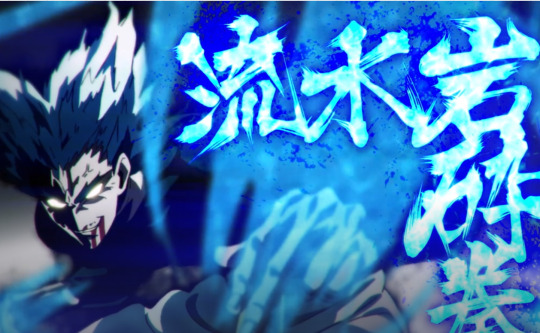
Garou: 50% Uncanney Faces, 50% Badass
aaaaaaaaaaaaaaaaaaand back to the freeky faces. Also, TTM’s “KUSO!!”
oh.
oh god.
The sound as he repeatedly bashes Mumen’s skull into the concrete. REPEATEDLY. my stomach. This fight is a rollercoaster of hype and pain oh no

Here have this screnecap so you can suffer, too
I must say, watching Garou fight otherwise is an absolute joy. The rest of this scene was so dynamic. I loved the way just glided through everyone and bounced around so fluidly. Keeping the water stream fist throughout it was also visually really pleasing. I need more. Give me more Garou fights, this is AMAZING. And that put us about half way through the episode like I predicted, which means I have no idea at what scene the episode will end.
“He’s here” Oh that was funny. Was that filler? I dont remember that either good shit good shit
YES IT THE
B A N A N A T I M E
TTM: “At least say I put up a good fight!!” Oh sweetheart I love you and appreciate you you did great

OH MY FUCK OH MY GOD OH FUCK GOOD OH FUCK SHIT FUCK
Oh shit that was a cool gag, how the newspaper flew past and garou just appeared. also. The most beautiful friendship is about to start and oh my god I’m so excited. Ok really I won’t lie- I would have been SCREAMING at Tareo on the screen if the didn’t just lead with Zombieman’s face in the catalog. I live for that pout. And his eyebrow is quirked like the heck u lookin at just. F. I’ve exhausted all my energy screaming at that. I’m so sorry.
Wait wait they still showed the side of his face again guys I’ve got it so bad for that 2D man help
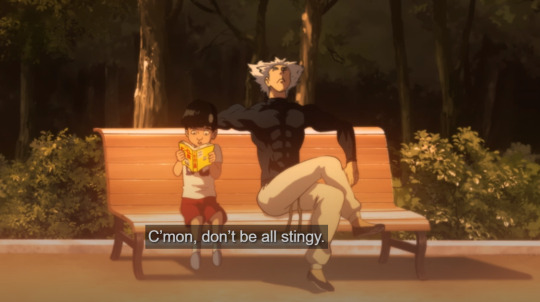
I’ve waited so long for this scene. OH MY FUCK the little leg bob guys someone gif it NOW. I love both of them so much. Also, Tareo’s voice is adorable. Watching that kid go through some shit is gonna be heart wrenching. FFF Anyway, it looks like we are getting GoldenBall and Spring Mustachio this episode? I was torn either way if we’d see that much. huh.
Oohhh Shit Sea King and Melzalgald! Wassup flashbacks?? Oh my gosh Saitama looks so excited I think thats the happiest we’ve seen him in a long time? No wonder he takes an interest in martial arts! AH! The ticket! The ticket! The tournament ticket!! I know a bunch of people considered the tournament filler and found it annoying, but I’m so excited for it!! Like, it seriously gave me a whole new respect for Lightning Max and Snek, I can’t wait to see those boys get the spotlight for a second again!

OMFG What is this jiiiiiiiiiiiiiiiiiiiiii-- wtf I am Cackling?? Oh my fuck its still going this is Peak Comedy
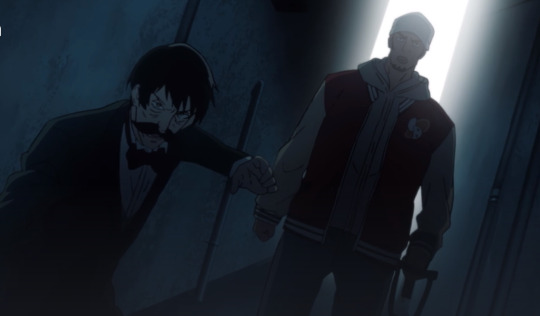
AH! I missed them! And I wish the screen wasn’t so dark, but otherwise SEE WHAT I MEAN? Shit watching Garou move is fun as hell, even if he’s barely moving. Also, is that legit bullet fire sound effects? I also love that those two get drinks together regularly enough that Spring knew something was up when GB wasn’t there. So good so good.
Garou: “Ding ding ding” Me: glorious you bastard
Question, what the fuck is that sword made of that it shoots rainbows for miles? Is it the power of gay? I mean I personally don’t ship Spring and GB buuuuuuuuuuuuuut…………………………….
OH IM SO DISAPPOINTED GAROU DIDNT JUST FLIP US ALL OFF JUST A THUMBS DOWN CMON I WAS EXCITED FOR THAT I FEEL RIPPED OFF. Also there’s that music again, but it didn’t play the whole time thank goodness.
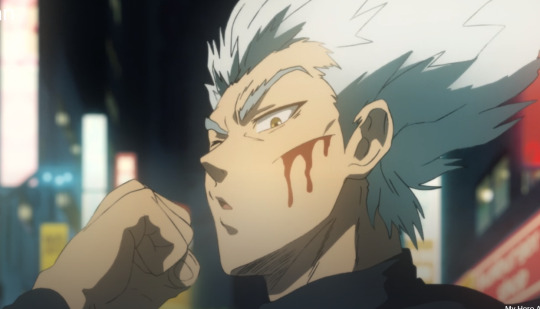
“Here comes the fan service to your screen” amirite?
Eh at least I got the satisfaction of watching the sleezeball get decked in the face. The brunette’s face when he asked for a kiss on the cheek is SUCH a MOOD. And oh fuck the ‘relax its for peace” Those two girls are the real stars of this episode I love them.

Obligatory “YES”ing at the screen rn hold on
OH FUCK GAROUS REACTION IS PRICELESS
Hey wait. HEY WAIT ARE THEY GONNA SHOW MY TRASH SON WAKING UP IN THE TRASH WHERE HE BELONGS??? THAT’S VERY IMPORTANT VERY
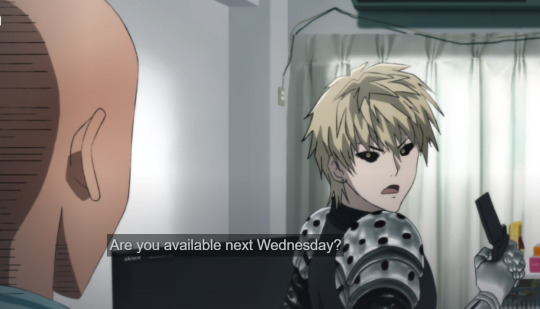
THE POST CREDIT SCENE. Genos I love you never change. Just. look at this precious boy. And the voice acting is perfect. I’m glad they ended on a humorous note this time. Gold.
IN SUMMARY: I honestly don’t feel like I have much to say or reflect on. I just really loved this episode. Favorite one yet. I mean of course I’m going to like it more as the story kicks the fuck up, but I genuinely had zero complaints, and actively enjoyed watching the animation.
Warning for next week btw, I’m going to be out of the country and also not really near civilization, so I probably won’t have wifi, so theres a good chance I wont be able to blog next week’s episode till I get back. Which I’m actually pissed about. because
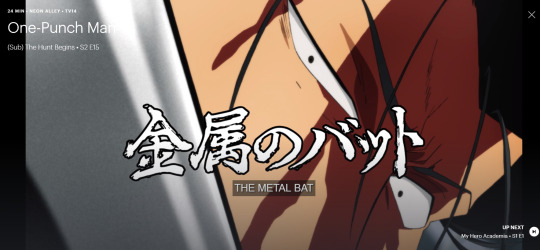
WE ARE GOING TO GET TO SEE METAL BAE KICK SOME MONSTER ASS AND IVE WAITED SO MANY YEARS TO SEE HIS STUPID DELINQUENT FACE IN ACTION FUCK MY TIMING MAN IM BOTH EXCITED AND PISSED of all the weeks I had to live in the wilderness UHG. Bet your ass I’m going to TRY MY DAMNDEST to get internet next Tuesday.
I’ll hopefully see yall next week, thanks for reading!
#FUCKIN SHIT FUCK METAL BAT#I#IM GOING#TO#DIE#DEAD#METAL BAT#Tank top master#bang#bomb#charanko#season 2#episode 3#s2e3#s2e15#garou#golden ball#spring mustachio#mumen rider#opm#saitama#genos#one punch man#live blogging#live blog#opmiss mumbling
12 notes
·
View notes
Text
Can the BBC’s Les Misérables do justice to Victor Hugo’s epic novel?
Few who love Les Mis the musical have read its source: a 1,500-page Victor Hugo novel. As the BBC tackles the book, David Bellos explains why it’s such a popular text to adapt.
The Sunday Times, December 16 2018, 12:01am
At dawn on June 19, 1815, in a muddy Belgian field where Napoleon has just lost his last battle, a scavenger filches the watch and purse of a dying soldier; a few weeks later, a long-term inmate of Toulon jail is released with a yellow passport and 109 francs. That’s where interlocking stories of Les Misérables begin, with Thénardier robbing the father of Marius, and Valjean setting off towards Digne.
If you think the magic of Les Mis comes mainly from the operatic version by Boublil and Schönberg, wait until you see the new adaptation by Andrew Davies, drawn from the book and not, like Tom Hooper’s 2012 film, from the musical, which leaves out most of Hugo’s novel’s story and doesn’t even mention the Battle of Waterloo. Davies’s script begins at the beginning, and the director, Tom Shankland, makes a truly memorable opener out of it.
Any adaptation of Les Misérables stands in a global tradition of spin-offs in every medium. In the cinema alone, there are about 70 full-length Misérables, in languages as varied as Russian, Farsi and Arabic. In Japan, there has been an independent strain of Mis-mania, expressed in manga and animé, for 100 years.
It’s not hard to see why Les Misérables is so much more attractive to dramatists than any other novel of the 19th century. Despite long passages of historical and philosophical discussion, Hugo’s saga of the poor has a simple narrative arc. It tells the redemptive life story of the former convict Valjean, from his release at Toulon to his death in Paris 20 years later. And, despite the sufferings that fill its pages, it is an optimistic story of how a man from the bottom of the pile may aspire to goodness and achieve it through persistence and sacrifice (plus the kind of luck that novels can invent). That’s dramatic enough.
Hugo was also a dramatist of genius. He created grand scenes ready for staging. The candlestick episode at Digne; the courtroom in Arras, where Valjean gives himself up to save an innocent man; the hold-up in Boulevard de l’Hôpital and Valjean’s escape from it; and the opening vision of a vulture-like thief robbing a dead man the morning after the greatest battle ever fought. Nearly all these great scenes feature a hero, part Hercules, part Christ, who defines himself through actions, not through thoughts and words. In fact, Valjean hardly says a word to himself, and not many to other people, either.
This leaves adapters and directors free to create their own image of this mythical figure. We’ve had a Valjean who looks like a tramp (the rough-hewn Harry Baur in Raymond Bernard’s 1934 film) and one who looks like a banker (in the Japanese TV serial), alongside handsome young men (Fredric March, Liam Neeson) and an action-movie star (Jean-Paul Belmondo) who had trouble pretending to be the right age. What we’ve not had is a Valjean who looks like Hugo: a short, broad-shouldered man in late middle age, in remarkably good physical shape. Despite being too tall, Dominic West, in this new TV version, comes closer than most. Les Misérables is not autobiographical (Hugo never went to prison, got buried alive or went down the sewers), but the writer’s moral self-identification with the suffering hero is one of the fundamental strengths of his book.
It was destined for the stage from the start. Even before the last volumes went on sale in July 1862, Charles Hugo, the writer’s son, began drafting a stage spectacular. A script doctor was hired to get it into shape for its premiere in Brussels in January 1863. It still flopped. But, published as a book, it influenced adaptations as to what to cut and keep.
The addition of music also has roots older than the West End musical version. Almost as soon as the first American translation of the novel appeared, a dramatist called Albert Cassedy dashed off Fantine, or The Fate of a Grisette, a popular opera with a score by Charles Koppitz. Music also plays an overlooked role in the novel: the tune Cosette practises on her piano- organ and the songs sung by schoolgirls in the Champs-Elysées, by convicts on tumbrils, by students in restaurants, hummed by a hunter in the woods and shouted out by an urchin on his way to the barricade, make up a concert programme of popular music in 19th-century France. It’s time to dust these off and perform them as the music Hugo had in his head.
Britain has had an unhappy relationship with Hugo’s epic tale because its authorised translation, by a retired military gentleman with his own views about what happened at Waterloo, was a complete disaster. For legal reasons, no new version could be brought out for decades thereafter. It didn’t help that the translation was available only in a costly hardback format.
Les Misérables reached its real audience in Britain through stage plays, and it’s amazing to see just how many there were: Charity, by CH Hazlewood, “founded on Victor Hugo’s story of Les Misérables”, was performed in London in November 1862; then came Jean Valjean, by Harry Seymour, Clarance Holt’s Out of Evil Cometh Good, in 1867, and many more. They concentrated heavily on Part I of Hugo’s five-part novel. The battle scene at Waterloo in Part II and the “revolutionary” stories of Parts IV and V seem to have been ignored most of the time.
In Russia, too, Tolstoy’s retelling of Les Misérables in simple language focused on Bishop Myriel’s charitable gift of silver to a rough customer. It was this fable-like episode, transposed into English by Norman McKinnel as The Bishop’s Candlesticks in 1908, that was turned into a silent short film by Herbert Brenon in 1913, which was then remade with a soundtrack in 1929. It never stopped, leaving Andrew Davies with a rich inheritance to renew — and to overturn. But he keeps one of the glitches that early translators made and that all Hollywood movie versions retain: he has Valjean steal the bishop’s silver cutlery, whereas in the novel he steals his silver plates (the French word “couvert” having changed its meaning).
One reason why Les Misérables has been remade in so many languages and periods is sex, or, more precisely, its total absence. It wasn’t prudery that kept Hugo off the topic. (He had plenty of experience, to put it politely.) But Les Misérables is about justice, social morality, crime, punishment, the meaning of history and the full potential of human life.
It’s true that old Gillenormand boasts of his past as a rake, but at 90 years of age, he’s long past acting out. It’s also true that Fantine becomes a prostitute — but Hugo deals with the episode in just seven words. Adaptations that put sex into the story express not what Hugo wrote about, but what some audiences are expected to find alluring.
On the other hand, a belief in the existence of a god is integral to the book’s meaning. Deeply sceptical of the Catholic church, Hugo omits Christian artefacts and rituals (including midnight Mass at Montfermeil and the church wedding of Cosette and Marius) to a degree that is almost comical in a panorama of 19th-century life, but he insisted that Les Misérables was a religious work. The prismatic glint of sunlight through foliage that Shankland deploys in the new BBC version, to show the start of Valjean’s conversion after robbing Petit-Gervais, seems to me an intelligent and respectful way of hinting at what Hugo meant.
One of the more puzzling aspects of Les Misérables and its flourishing international afterlife is its exclusive focus on France. There’s not a single foreigner among the 120 named characters in the novel; barring occasional remarks about London, Poland and the United States, Les Misérables talks exclusively about the history, politics, social structure and social ills of the country that Hugo considered to be top nation for all time, namely his own.
Though largely written in Guernsey and initially published in Belgium, the book was written for the French by a man whose long exile had no foreseeable end. Its first translator into Italian requested permission to cut historical passages because “there are some Italians, rather a lot in fact, who say: ‘This book, Les Misérables, is a French book. It is not about us. Let the French read it as history, let us read it as a novel.’”
Permission was refused. The intensity and completeness of this exposition of the social ills in 19th-century France effectively turned that now mythical place into a stand-in for the whole world. You can’t blame Hugo for not being in tune with 21st-century ideas of the politically correct, but you have to admire him for standing outside the conventions of his day.
His response to the translator has a prophetic sense, and answers in advance the question of why his French-focused masterpiece continues to attract readers, fans and adapters all over the world: “I do not know whether [my book] will be read by all, but I wrote it for everyone... Social problems go beyond borders. The sores of the human race, these running sores that cover the globe, don’t stop at red or blue lines drawn on the map. Wherever men are ignorant and desperate, wherever women sell themselves for bread, wherever children suffer for want of instruction or a warm hearth, Les Misérables knocks on the door and says, ‘Open up, I have come for you.’”
David Bellos is the author of The Novel of the Century: The Extraordinary Adventure of Les Misérables (Penguin £10.99). Les Misérables starts on BBC1 on Dec 30 at 9pm; Dominic West is interviewed in the Magazine next Sunday
‘The Glums’: a potted history
● The full text of Les Misérables in the right order of reading was not available to British readers until 2008, in a version by the Australian writer Julie Rose.
● In 1897, the Lumière brothers shot a one-minute reel of a quick-change artist masquerading as Hugo, Valjean, Thénardier, Marius and Javert. This was the first time fiction had ever appeared on celluloid film.
● Victor Hugo’s wife, Adèle, operated as publicity manager for the novel’s launch. She created a poster campaign featuring illustrations of the main characters, making the novel’s imminent appearance known long before its publication. Nothing like that had been done before. She also had announcements prepared for newspapers and requested that they were held back from publication until she gave the signal, making Les Misérables probably the first work launched under embargo.
● When Hugo was ready to publish Les Misérables in 1862, he secured the publishing deal of all time: in today’s terms, he was paid about £3m as an advance on a contract allowing the publisher Albert Lacroix to print the book for just eight years. Lacroix had to get a huge bank loan to finance the book.
● Charles Dickens met Hugo in Paris in 1847, visiting his splendid apartment on Place Royale. There is not a trace of the event in Hugo’s records, which suggests the British author didn’t make a strong impression on the literary star of his day. In Dickens’s eyes, though, Hugo looked “like the Genius he was”.
● Hugo’s contemporaries weren’t all taken with his novel: “This book is written for catholico-socialist shitheads and for the philosophico-evangelical ratpack,” Gustave Flaubert wrote to a friend.
● When Hugo fled France in 1851, both his sons were in prison and Louis-Napoléon — Napoléon III — was his sworn enemy. “Because we had Napoléon le Grand, do we have to have Napoléon le Petit?” he quipped.
● Les Misérables has been adapted for radio and cinema more times than any other novel.
● Classical literary French had a restricted vocabulary. Racine got by with about 2,000 words. Hugo uses about 20,000 different words in the 630,000 words of the text of Les Misérables — maybe as many as in all of Shakespeare working in English, which has a much larger vocabulary in the first place.
https://www.thetimes.co.uk/magazine/culture/can-the-bbcs-les-miserables-do-justice-to-victor-hugos-epic-novel-50wtqgvdj?t=ie
49 notes
·
View notes